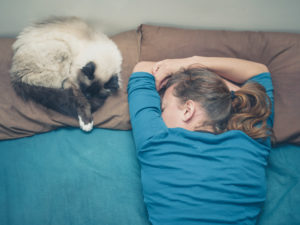Help me Sleep!
How well do you sleep? If you are like most teens and college students, then probably not too well. Most people between the ages of 14 and 24 have demanding school, work, and activity schedules that favor the Night Owl lifestyle with hopes of “catching up” on the weekends. Additionally, the biological clock naturally shifts forward in adolescence, which means that adolescents experience a surge in energy in the evening while rising in the morning is more difficult. As many as 75% of college students report difficulty falling asleep, excessive sleepiness during the day, or sleep disturbances. Many of these students report that emotional and academic stress worsen their sleep problems, which can in turn increase the stress, which then leads to more sleepless nights. If this sounds familiar to you, there are ways to reduce your stress by improving your sleep.
Healthy Sleep Habits
If you have difficulty getting enough sleep or feeling rested, try some of these tips to develop healthy sleep habits:
- Develop a bedtime routine and use this routine consistently. Following the same ritual before bed and having a consistent bed time (including weekends) can create and improve the consistency of your sleep patterns.
- Make room in your schedule for 7-9 hours of sleep. This is the average amount of sleep an adolescent/college student needs, which is often far less than the schedule allows.
- This is where naps come in! Naps late in the day are not very helpful, but a 30-minute nap before mid-afternoon can do wonders.
- Only use your bed for sleep and the activities that promote sleepy time, such as reading and journaling on paper. If you avoid watching tv, doing homework, or playing on your phone in your bed, you train your brain to know that bed = winding down.
- Exercise for 30 minutes per day on most days. Not only does exercise help you sleep more soundly, but it will also keep you more alert throughout the day.
- If you lay in bed for 20 minutes trying to fall asleep, just go ahead and get out of bed. Sometimes the anxiety over not being able to fall asleep complicates the problem and makes it even more difficult. Get out of bed and do something mundane like fold laundry or clean your room before trying the routine again.
- We recommend this chart as a way to track your patterns and get a baseline on your current sleep habits.

When to See a Doctor
If the tips listed above don’t do the trick or if you experience any of the following symptoms, schedule an appointment with your family doctor or with a sleep specialist:
- You gasp, choke, or stop breathing during sleep. If you have a bed partner or roommate, ask that person if they have observed any of these behaviors in you while you sleep.
- You fall asleep at inappropriate times, such as while eating, talking, or walking.
- You feel excessively sleepy during the day and the tips above don’t seem to help.
Need a Laugh?
Hear comedian Mike Burbiglia’s recounting of his own experience with sleep disorders. But remember that even though his stories are amusing, sleep disorders can be extremely serious and should definitely be checked out by a doctor.
How Sleep Savvy are You?
Test your knowledge about sleep by reading the National Sleep Foundation list of common myths.
Blog written by Sarah Souder Johnson, MEd, LPCC











